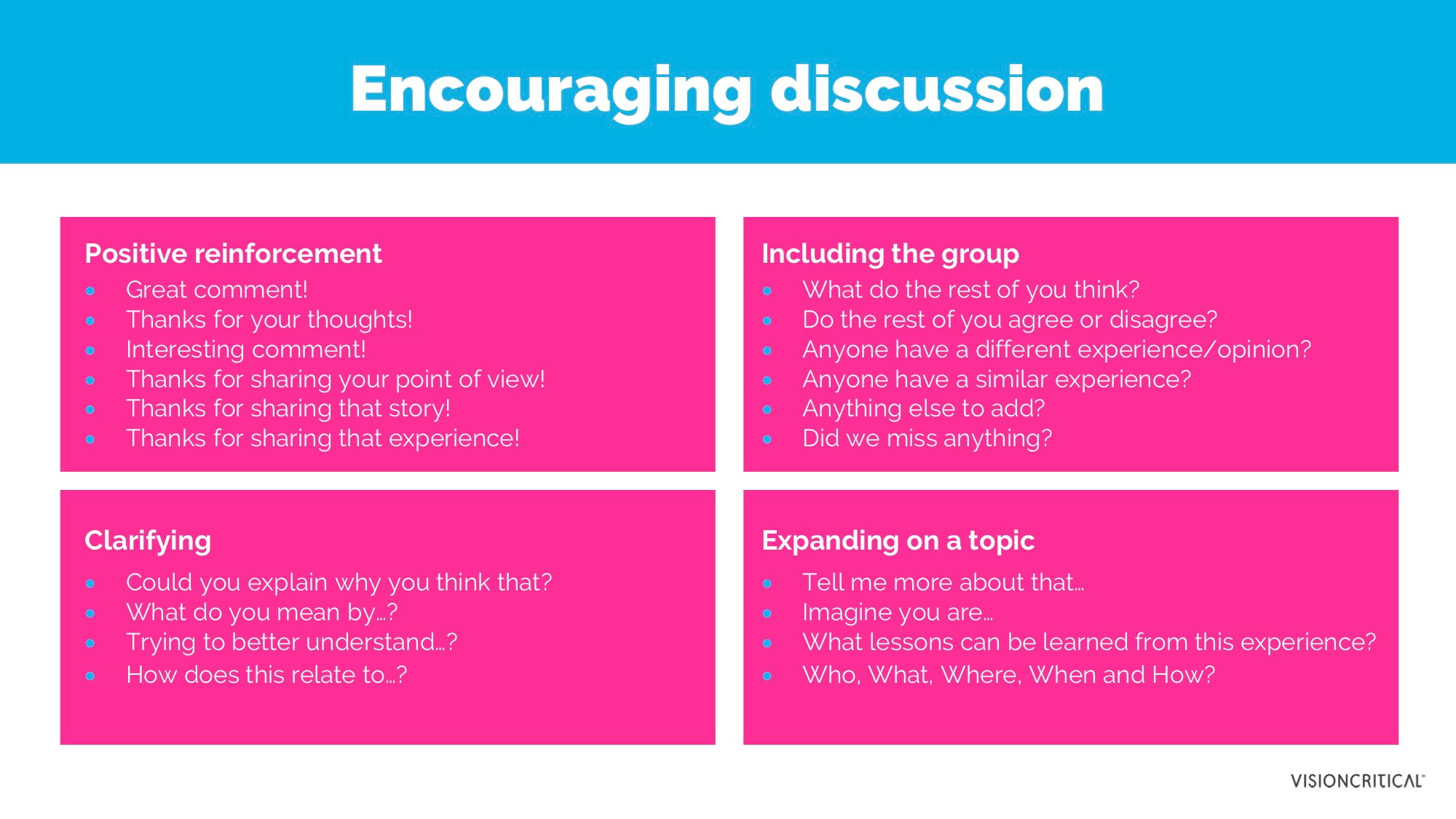You don’t need to be a professional focus group moderator to run a discussion forum. It’s more like hosting a dinner party; if you can converse with people in an engaging way and follow some basic rules then you are set.
That said, conversations don’t happen by magic. Just like hosting a dinner party, you’ll need to invite the right mix of people and think about what to do to ensure people are engaged and having a good time.
Read on for our best practices on:
- Daily moderation / monitoring
- Encouraging discussion
- Interaction tips
- Handling challenging posts
- Frequently asked questions
Looking for the technical details, check out Webhelp.
Daily monitoring is important
Checking in on the forum daily is important. We have seen a rare, few instances of high-risk behavior in forums. For example: a member who is considering suicide. These instances need to be addressed immediately and would get missed if only checking periodically.
Encouraging discussion
Show you’re listening! Typically, response rates are higher if you interact with members in the discussion versus just read and monitor the conversation. Posting probes to individuals, global follow-ups to everyone in a new thread, and any new questions you have in new threads will show members you’re listening and valuing their opinions. All of the following comments or phrases, and any variation, can be used to feed and encourage discussions.
Interaction tips
- Be human, personal, and honest.
- Introduce yourself. Share something about yourself (what you do, what you want to learn, something funny/interesting). Don’t make up a fake persona. A keen member may call you out. If you’re not sure of an answer to a question, tell them you’ll find out and reply to them later with answer.
- Give clear and concise instructions about what you’re looking for. If you have multiple questions in one thread, use numbers or bullets to differentiate. Say: “I’d like to find out what you think about these 3 things:” If you want a story… ask for a story. Otherwise some will give very short answers.
- Don’t ask closed ended questions. That’s what surveys are for. Discussions are for encouraging dialogue and planting conversation seeds.
- Photo uploads. If you’re asking people to upload photos or do an activity in situ, be clear on what you’re looking for to get the best results.
- Be direct in your line of questioning. Be more direct and give up more control than you’re used to. Get your questions right the first time.
- Don’t ask too many questions. Start with 3-4 conversation starters (with a max of 2-3 questions within each topic). Should be interesting, controversial, thought provoking subject lines. Include a Meet and Greet if in early days of community, and post a “What else should we know” topic if members can’t start their own topics.
- Spend the most time after invite is deployed. Plan for a couple of hours when the invite launches, and at least 30 minutes the other days the discussion is running.
- Greet the first posters and thank them. Check to make sure your questions are getting answered the way you hoped they would. Fix questions if they’re not working.
- Respond in a conversational tone. Be authentic and respectful when you reply. Be yourself.
- Use the filters to find posts you haven’t read yet. Look posts up by day. Mark posts you want to keep for reporting or sharing.
- Before sending out reminders…Post additional probes to individuals, global follow ups to everyone in a new thread, and any new questions you have in new threads. Remember – conversations don’t happen by magic. Make sure to send direct links in all emails and send members to discussions at end of surveys.
- Take notes and flag quotes while you moderate. This will make reporting go much faster.
Handling Challenging Posts
Address challenging behaviors quickly to keep your discussion on track. Keen members will often shut down the challenging behavior themselves, but it's still a good idea to set ground rules at minimum so people know what the expectation is. Use this table to help guide you.
.jpg?width=2000&name=BestPractices_ForumModeration_ChallengingPosts0418%20(1).jpg)
Download this resource with common challenges and recommended solutions
Frequently asked questions
Should someone monitor/moderate over the weekend? It really depends on the topic and who is invited. The safest alternative is to run Monday-Friday and then close. If you do run over the weekend let members know whether you will be checking in or not.
Should we seed a forum before launching it? It’s a good idea to seed if you’re posting your conversation starter in the welcome / whiteboard area. Otherwise members will show up and there won’t be any conversation happening yet. Be careful not to bias responses. For example: If you’re running “Letter to the CEO” you could post an example of the letter you’re looking for but reference the moderator’s favorite brand instead of the brand/company sponsor of the community.
What if I really want to see more “numbers” in the data? Linking a survey and forum together so you can get a readable base is a great idea. Keep the survey short and related to the topic of the forum so you can link the two together. Running a survey first is also a great way to guide members through some questions first before they get to the more open and organic discussion.
What are some best practices for running ongoing forums? It’s better to run regular forums on a focused topic and then close them versus having an always open free for all. It’s difficult to find the signal in the noise of a free for all. If you’re running regular forums make sure to keep some lighter than others. You can get insight even if the focus is more on engagement, especially if you want to learn more about the life context of your community members.
Can you run discussions on blind communities? Yes, absolutely! You may run the risk of members starting to guess who the community is being run by, but you can ask them to stay focused on the topic of the discussion when you send the invites or if the issue starts to come up in the forum.
Can I run a meet and greet if it’s the only forum I plan on running? Yes, you can, but your members will likely enjoy the experience more if you give them a problem to solve or talk about something brand related. Meet and greet forums are more appropriate if you’re planning on running regular discussions.








